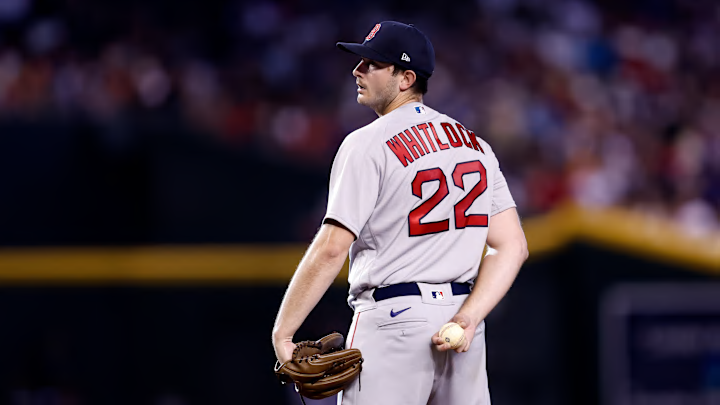When the Boston Red Sox swiped Garrett Whitlock from the New York Yankees in the Rule 5 Draft right before the 2021 season, life was as bad as it could be. The right-hander had an elite rookie campaign out of the bullpen and the Sox ended the Yankees' season in the Wild Card Game.
At the start of the 2022 season, Chaim Bloom, who was largely unable to negotiate with his players that offseason due to the lockout, wasted no time in extending Whitlock. The pitcher was awarded with a four-year, $18.75 million extension after putting up a 1.96 ERA, 1.11 WHIP, 2.84 FIP and 81 strikeouts in 73.1 innings. He was also suckered into team options for the 2027 and 2028 seasons.
Then, two weeks later, Whitlock was all of a sudden being transitioned to a starting pitcher, which he had been in his minor-league days with the Yankees, but certainly without enough experience to immediately just ... be that at the MLB level.
From 2017-2019, Whitlock logged 38 starts. He had an incredible showing in 2018 between Low-, High- and Double-A and then regressed a bit in 2019 with the Trenton Thunder (Double-A) before needing Tommy John surgery.
He missed about half that season and was one of the few players that benefitted from the canceled 2020 COVID year because he was rehabbing anyway. Shortly after, the Red Sox saw an Instagram video of him and the rest is history.
Red Sox sign RHP Garett Whitlock to 4-year contract extension, with 2 club option years, potentially buying out 2 FA years. Signing bonus $1 million. Salaries of $1 million (2023); $3.25m (2024); $5.25m (2025); $7.25m (2026). Club options $8.25m and $10.5m. Total value: $18.75.
— Sean McAdam (@Sean_McAdam) April 10, 2022
Red Sox manipulating Garrett Whitlock contract extension is a weasel move
This move by the Red Sox embodies the Bloom era under this cheap, cost-cutting, morale stomping ownership group. The plan was probably never to keep Whitlock as a reliever after he signed that deal. The clandestine operation felt like it was meant to move him into a starter role after they signed him for ~$4.5 million per year. That's how the organization wins. They fill arguably their most important position of need with a cost-effective salary.
Sure, Whitlock got a raise in the short term, but the Red Sox were protecting themselves from him performing exceptionally well over the next 4-5 years, which would've cost them dearly in the arbitration process. He was already fast-tracked on that front after his rookie campaign.
So while it felt like that deal occurring as early as it did was in good faith, it was perhaps an act of manipulation by the front office to minimize financial exposure.
Garrett Whitlock has a 1.85 ERA against the Yankees over 13 games and 24.1 innings.
— Pete Abraham (@PeteAbe) June 10, 2023
Tonight was his first start.
His line over the 13 games: 24.1 IP. 11 H, 6 R, 5 ER, 5 BB, 32 K.
Those two club options are for $8.25 million and $10.5 million, taking his potential control through his age-32 season. In no way does this benefit the player in the long term. If Whitlock even performs decently as a starter -- the most lucrative free agent market of them all -- he probably won't become a free agent until 2029.
It's easy to see Boston strategically managed his workload, too. Last year, he made nine starts, and was pulled back from that role after June 7 (his last start) when he hit the injured list with a hip injury (he missed nearly six weeks). He returned to the bullpen for his final 18 games (he was also there in an extended role for the first four games of the season), rehabbed the injury in the offseason, went down with an elbow injury for a bit in the beginning of the year, and was immediately back in the rotation (seven starts so far).
Three out of his last four have been really good, too, so the suits' plan is coming to fruition. But the other sad part about this is that it's one of very few of the front office's "key" moves in helping the Sox move forward (as you can see, they moved Whitlock out of the 'pen and added short-term, high-AAV arms in the bullpen to protect themselves), and it's not really working at the moment. But the Red Sox aren't wrong -- it's definitely more cost-effective to pay veterans Kenley Jansen $24-$25 million total per year to anchor the back end of the bullpen through only 2024 instead of invest, say, $162 million in someone like Carlos Rodón, who has yet to pitch in 2023. Whitlock provides the lowest possible risk at a price the team is comfortable with, even if he were to miss time. Just look at how much they regret the $150 million Chris Sale extension.
Well, nonetheless, here's to hoping Whitlock excels and the Red Sox sink. That's a win-win for all.
